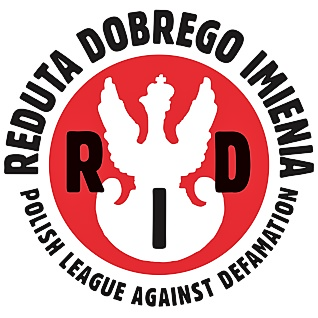Oral arguments in the civil suit filed in May 2019 against Polish historians Barbara Engelking and Jan Grabowski, co-authors of the controversial book Night Without an End, begin today in the Warsaw District Court. The case was brought by Mrs. Filomena Leszczyńska, the niece of Edward Malinowski, whom the two historians accuse in their book of denouncing Jewish inhabitants of his village to the Nazis during World War II.
According to the plaintiff, the authors’ careless research confuses two different and unrelated people, both named Edward Malinowski, and creates a fictitious Nazi collaborator out of Mrs. Leszczyńska’s late uncle, real-life village mayor and war-time hero, who risked his life hiding Jews during the Holocaust. The plaintiff is represented by a private non-profit, the Polish League Against Defamation.
In January 2019, Mr. Grabowski filed a libel suit against the Polish League Against Defamation, after the non-profit published an open letter signed by more than 100 scholars who questioned the methodology and quality of his historical research.
“In a case such as this, a thorough review and an in-depth verification of primary sources is in order. Unfortunately, in my opinion, the authors of Night Without an End failed to do either of those things, and smeared an innocent man. Consequently, in their publication, Grabowski and Engelking presented a false picture that I believe is harmful not only to the reputation of Mr. Malinowski and his family, but to the reputation of every Pole,” said Maciej Świrski, president of the Polish League Against Defamation, the non-profit that supports Filomena Leszczyńska’s efforts to clear her late uncle’s name.
Świrski adds that creating what amounts to a fictitious character out of biographies of two different men is not the only factual mistake that the authors made. He offers some examples: Information about Edward Malinowski’s alleged involvement in the murder of Jews was based on Maria Wiltgren’s testimony submitted to Yad Vashem in 1996. But the same Maria Wiltgren (a.k.a. Estera Drogicka) testified as a witness for defense in Edward Malinowski’s Stalinist trial in 1950. Maria Wiltgren (Estera Drogicka) testified in his case yet again shortly after the war when she successfully applied for a job with the communist security police (her employment files containing a signed contract are available in the archives).
According to the plaintiff, the authors of Night Without an End did not verify archival documents as basic as the extant biographies of Maria Wiltgren, who appears in various documents relevant to the Edward Malinowski case, under four different aliases. Moreover, Grabowski and Engelking never mention the biography she submitted shortly after the war as part of her security police job application, which offers important details. “In my opinion, such selective use of available evidence and archival sources by the authors of Night Without an End does not meet the most basic standards for factual accuracy, intellectual integrity, and honest scholarly research. Thanks to Mrs. Leszczyńska, we now know about the Edward Malinowski story, but we have reason to believe that there are many other mistakes in this book, as various historians have already pointed out,” adds Maciej Świrski.
Night Without an End portrays Filomena Leszczyńska’s late uncle Edward Malinowski as “an accessory to the murder of several dozen Jews who were hiding in the woods and were denounced to the Germans.” Not only was Edward Malinowski not complicit in their death, but, in fact, he helped Jews. In falsely accusing Malinowski of collaborating with the Nazis, Jan Grabowski and Barbara Engelking do not appear to have examined the available documents with proper attention to detail, a professional standard expected of a historian. Had they done their job properly, they would have been able to distinguish between Edward Malinowski, the son of Stanisław and mayor of Malinów, and another Edward Malinowski, the son of Adolf and former mayor of the village – many families in Malinów were named “Malinowski,” after the name of their village. The two men had the same name; during the occupation, both had contact with Maria Wiltgren whose 1996 testimony, according to the defendants, gave rise to the accusations made against Filomena Leszczyńska’s late uncle, Edward Malinowski.
However, Edward Malinowski was tried in 1950 and found not guilty; the accusations against him were proven false when the survivors he saved during the war testified at the trial in his defense. Maria Wiltgren herself would only able to offer hearsay: she was not in Malinów at the time the Jews hiding in the forest near the village were denounced. She came only a year later, and did not witness the events. And yet, in Night Without an End, Barbara Engelking and Jan Grabowski chose to cite her and not the more reliable, eye-witness and survivor testimony from Malinowski’s 1950 acquittal. They use Wiltgren’s 1996 testimony about events she only heard repeated by others more than half a century earlier, a curious choice.
According to the plaintiff’s lawyers, the defendants did not properly analyze the documents referring to Maria Wiltgren. Nor have they cross-referenced those documents with available archival files or the evidence presented at the 1950 trial. Had they done so, they would have discovered that the Edward Malinowski whom they describe in their book as a Nazi collaborator responsible for deaths of his neighbors is in fact a man who risked his own life to save them.
The plaintiff, Filomena Leszczyńska, demands that the defendants repair the reputational harm done to her family by issuing public corrections, publishing Maria Wiltgren’s full testimony (taking into account all four aliases, including statements made under the name Wiśniewska), and paying damages in the amount of PLN 100,000.
The Polish League Against Defamation covers all legal and administrative costs of this case.
